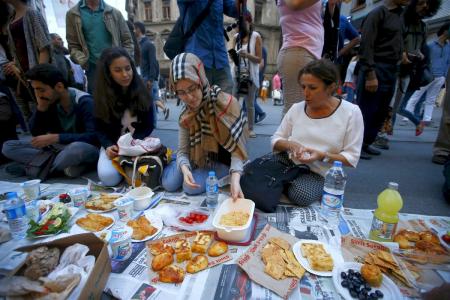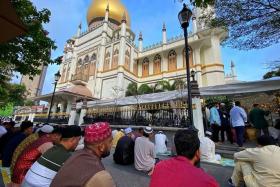'Not even water?' Answers to common questions about the fasting month and Hari Raya
"Really? Cannot eat at all?"
It's a common question asked of myself and my fellow fasting family and friends by non-Muslims during this period.
Muslims the world over fast for the whole month of Ramadan, the ninth month in the Islamic calendar.
In Singapore, Ramadan started on the evening of Wednesday, June 17, with Muslims going through their first full day of fasting on Thursday.
The next question is usually: "But can drink water, right?"
While it is often the same questions asked on an annual basis, it's better to ask than stay quiet.
In the interest of clearing up a few things once and for all for my non-fasting friends, here are the answers to some of your fasting month questions.
Why do you fast?
Fasting is one of the five pillars of Islam – anyone who is of age (generally determined by reaching puberty), and is not ill or in a situation which makes it difficult for them to complete their fast (eg strenuous work), must fast.
For Muslims, fasting during the month of Ramadan is not just about abstaining from food and drink.
It's also about abstaining from other things from sun rise to sundown – such as smoking and sex.
We are encouraged to stay away from all kinds of temptation.
But drinking water is okay, right?
No, really, we can't!
Not water, or tea, or milk, nothing.
Yes, in this weather, this means you can get really parched, but the idea is to tahan (take it) until about 7 in the evening, when we're able to eat and drink again during the iftar, or breaking of fast.

Prime Minister Lee Hsien Loong joining congregants of the newly upgraded Mujahidin Mosque in Commonwealth for a break fast, or iftar, session in 2014. ST FILE PHOTO
So you can eat in the evening. When do you stop eating then?
We generally stop eating and drinking at imsak, which is about 10 minutes before the break of dawn, a practice of the Prophet Muhammad.
We are encouraged to wake up in the early mornings – around 4 to 5am in Singapore – to eat something before imsak - this morning meal is called sahur.
For some, it's a couple of dates. For others, it can be a full meal of rice and other dishes.
We eat again at sundown, which coincides with the time of the Maghrib prayer, one of the five prayers Muslims do every day.
What happens if you accidentally eat or drink something during the day?
It can happen, simply out of habit. This has happened to most Muslims I know. If it's unintentional, we keep fasting.
What happens if you feel dizzy, or ill?
Only those who are well enough to fast should do so. You are permitted to break your fast if you are unwell.
So, do you have to "pay back" for the days you didn't fast?
Yes, we should pay back the missed days as soon as possible.
It doesn't have to be continuous but before the next Ramadan comes around.
If one is unable to repay, or unable to fast for years, then he or she can pay fidyah, a sum of money calculated using the number of days missed that will be donated to the poor.
So do NSmen have to fast?
Yes, if they are not ill. A guidebook from the voluntary welfare organisation Perdaus encourages fasting NSmen to drink lots of water and eat in the morning before sunup to help them through the day.
Uh, should I not eat or drink in front of you?
That's entirely up to you! Food smells are certainly much more distracting on an empty stomach, so it would be nice if you didn't.
But dealing with temptation is a strong theme for us Muslims during Ramadhan. Just, you know, don't tempt us on purpose, lah.

BH FILE PHOTO
How about those countries where the sun sets at night, or sometimes not at all during the summer months?!
I had the same question when I was a kid. Do they, like, never eat at all?
They do but their fast is longer.
Now that it's summer and days can be very, very long in the northern hemisphere.
Muslims in places like Reykjavik, Iceland, may fast for up to 21 hours a day, reports Quartz.
However, some scholars say that for health reasons, Muslims in such places could follow the "morning to evening" timings for fasting.
So, after Ramadan ends, you celebrate Hari Raya, which is Muslim New Year, right?
Actually, Hari Raya Puasa, or Aidilfitri, means 'festival of breaking of fast' in Arabic.
We celebrate it right after Ramadan ends, during the next month in the Islamic calendar, Syawal.
Muslims are not permitted to fast on Hari Raya Puasa.
In Singapore and in some other countries, the celebrations continue for a month, with friends and family visiting each others' houses in traditional garb, presenting both children and elders with 'green packets', and serving traditional Malay kuih, or cookies.
It is all-encompassing as non-Muslims are invited over, too!

BH FILE PHOTO
Unlike Chinese custom, the younger members of the family generally stop receiving green packets after they've started working. Eating dishes like ketupat, rendang and ayam masak merah, however, is permitted no matter how old you are.
Oh, and we do have a "Muslim New Year", or more accurately Islamic New Year.
It falls on the first day of the first month in the Islamic calendar, called Muharram. Our next New Year will be from sunset on Oct 13 to sunset of Oct 14.
There's another Hari Raya on my calendar. What's the difference?
That would be Hari Raya Haji, which marks the end of the annual Hajj, where millions of Muslims travel to Mecca to perform the pilgrimage.
On this day, those who are able are meant to sacrifice, or korban, a goat, a cow or a sheep, with the meat being meant for your family, neighbours and the poor.
No, you don't have to go to butchery school! Your neighbourhood mosque will likely be able to conduct the sacrifice on your behalf. Some Muslims opt to pay for animals to be sacrificed in other, usually poorer countries, so the meat can be distributed to the needy there.
The korban commemorates the prophet Ibrahim's willingness to sacrifice his son Ishmael (the Quran doesn't exactly say which son, but we believe it's Ishmael, while Jews and Christians believe it's Isaac).
Don't worry, the story has a happy ending – at the last minute, the sacrifice is stopped and Ibrahim (or Abraham as he is otherwise known) is told by God that the deed has been fulfilled, as Ishmael has been replaced by a "great sacrifice".
Okay, why do both Hari Rayas keep occurring earlier every year?
Because we get more and more eager to celebrate?
No. The real answer is that the dates are determined by the Islamic calendar, which has 12 months, but just 354 days.
The months are shorter as they follow the lunar cycle – the first day of the month starts when the first crescent is spotted. That's how the beginning of Ramadhan is determined as well.
(The Islamic calendar is fully lunar, while the Chinese calendar is lunar-solar ... that's why Chinese New Year doesn't move around as much as Hari Raya does.)
Also, this is why some years you get a public holiday bonanza, with Hari Raya Puasa falling in the same week as Chinese New Year from 1996 to 1998, and Hari Raya Haji (Eid-ul Adha) falling two days after Christmas in 2007.
Hopefully these answer the basics.
Get The New Paper on your phone with the free TNP app. Download from the Apple App Store or Google Play Store now



